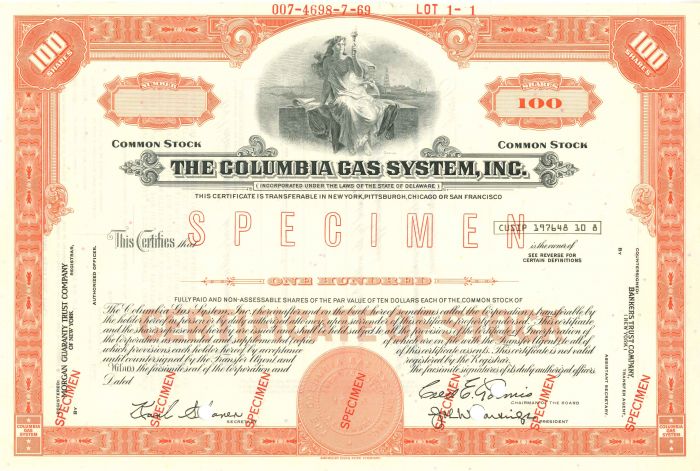Columbia Gas System, Inc. - Specimen Stock Certificate
Inv# SE1968 Specimen Stock
Specimen Stock printed by American Bank Note Company.
A public utility company (usually just utility) is an organization that maintains the infrastructure for a public service (often also providing a service using that infrastructure). Public utilities are subject to forms of public control and regulation ranging from local community-based groups to statewide government monopolies.
Public utilities are meant to supply goods/services that are considered essential; water, gas, electricity, telephone, and other communication systems represent much of the public utility market. The transmission lines used in the transportation of electricity, or natural gas pipelines, have natural monopoly characteristics. If the infrastructure already exists in a given area, minimal benefit is gained through competing. In other words, these industries are characterized by economies of scale in production.
There are many different types of public utilities. Some, especially large companies, offer multiple products, such as electricity and natural gas. Other companies specialize in one specific product, such as water. Modern public utilities may also be partially (or completely) sourced from clean and renewable energy in order to produce sustainable electricity. Of these, wind turbines and solar panels are those used most frequently.
Public utilities have historically been considered to be a natural monopoly. This school of thought holds that the most cost-efficient way of doing business is through a single firm because these are capital-intensive businesses with unusually large economies of scale and high fixed costs associated with building and operating the infrastructure, e.g. power plants, telephone lines and water treatment facilities. Natural monopolies tend to be regulated by governments following the public interest. However, being a natural monopoly is not a necessary prerequisite for government intervention and regulation. Industries that are not natural monopolies could be regulated for several reasons, for example service reliability, universal access, and national security.
Over the past several decades, traditional public utilities' monopoly position has eroded. For instance, wholesale electricity generation markets, electric transmission networks, electricity retailing and customer choice, telecommunication, some types of public transit and postal services have become competitive in some countries and the trend towards liberalization, deregulation and privatization of public utilities is growing. However, the infrastructure used to distribute most utility products and services has remained largely monopolistic.
Key players in the public utility sector include:
- Generators produce or collect the specific product to be used by customers: for example, electricity or water.
- Network operators (grid operators, regional network operators, and distribution network operators) sell access to their networks to retail service providers, who deliver the product to the end user.
- Traders and marketers buy and sell the actual product and create further complex structured products, combined services and derivatives products. Depending on the product structure, these companies may provide utilities and businesses with a reliable supply of a product like electricity at a stable, predictable price, or a shorter term supply at a more volatile price.
- Service providers and retailers are the last segment in the supply chain, selling directly to the final consumer. In some markets, final consumers can choose their own retail service provider.
Public utilities must pursue the following objective given the social responsibility their services attribute to them: -Ensuring services are of the highest quality and responsive to the needs and wishes of patients; -Ensuring that health services are effectively targeted so as to improve the health of local populations; -Improving the efficiency of the services so the volume of well-targeted effective services is the widest, given the available resources.
The management of public utilities continues to be important for local and general governments. By creating, expanding, and improving upon public utilities, a governmental body may attempt to improve its image or attract investment. Traditionally, public services have been provided by public legal entities, which operate much like corporations, but differ in that profit is not necessary for a functional business. A significant factor in government ownership has been to reduce the risk that an activity, if left to private initiative, may be considered not sufficiently profitable and neglected. Many utilities are essential for human life, national defense, or commerce, and the risk of public harm with mismanagement is considerably greater than with other goods. The principle of universality of utilities maintains that these services are best owned by, and operating for, the public. The government and the society itself would like to see these services being economically accessible to all or most of the population. Furthermore, other economic reasons based the idea: public services need huge investments in infrastructures, crucial for competitiveness but with a slow return of capital; last, technical difficulties can occur in the management of plurality of networks, Â example in the city subsoil.
Public pressure for renewable energy as a replacement for legacy fossil fuel power has steadily increased since the 1980s. As the technology needed to source the necessary amount of energy from renewable sources is still under study, public energy policy has been focused on short term alternatives such as natural gas (which still produces substantial carbon dioxide) or Nuclear power. In 2021 a power and utilities industry outlook report by Deloitte identified a number of trends for the utilities industry:
- Enhanced competition, sparked by regulations such as FERC's Order 2222 that open up the market to smaller, innovative firms using renewable energy sources, like wind or solar power
- Expansions in infrastructure, to manage new renewable energy sources
- Greater electrification of transportation, and longer-range batteries for cars and trucks
- Oil companies and other traditional-energy players entering the renewable-energy field
- A greater emphasis on disaster readiness
Stock and Bond Specimens are made and usually retained by a printer as a record of the contract with a client, generally with manuscript contract notes such as the quantity printed. Specimens are sometimes produced for use by the printing company's sales team as examples of the firms products. These are usually marked "Specimen" and have no serial numbers.










Ebay ID: labarre_galleries